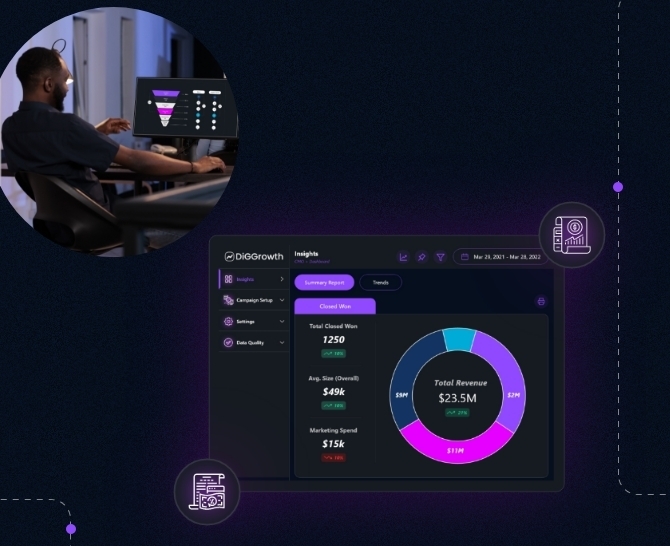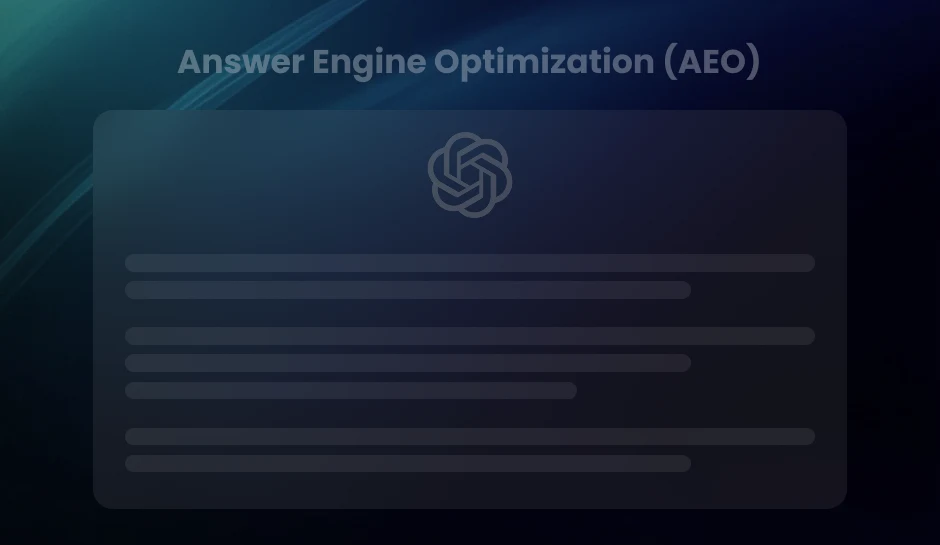
Why You Need a Marketing Analytics Platform to Complement Your Marketing Automation Software
While different marketing automation software providers have given marketers the ability to report on a variety of metrics, the platform itself falls short when it comes to reporting and analytics. In this blog post, we have covered the limitations of the analytics and reporting aspect of marketing automation and how a solid marketing analytics platform helps marketers overcome those limitations.
Marketing automation has been a game-changer for marketers, streamlining and automating many of the repetitive and time-consuming tasks involved in running marketing campaigns.
However, one aspect that has often been overlooked is the reporting and analytics capabilities of marketing automation platforms. While these platforms offer some basic reporting features, they fall short when it comes to providing deeper insights into customer behavior, campaign performance, and overall ROI.
This is where marketing analytics platforms come into play.
Let’s dive into the limitations of the analytics and reporting aspect of marketing automation and how a solid marketing analytics platform helps marketers overcome those limitations.
Common Reports & Insights You Can Get From Most Marketing Automation Platforms
Most marketing automation platforms offer a range of common reports and insights that help marketers track the performance of their campaigns and identify areas for optimization. Some of the most common reports and insights include:
- Email Performance Metrics:
- Lead Generation Metrics:
- Campaign ROI:
- Social Media Metrics:
- Web Analytics:
Marketing automation platforms offer detailed reports on email campaigns, including open rates, click-through rates, conversion rates, and unsubscribe rates. These metrics help marketers identify which emails are performing well and which ones need optimization.
Marketing automation platforms provide insights into lead generation efforts, such as the number of leads generated, lead source, and lead quality. By analyzing these metrics, marketers can identify which lead sources are driving the most qualified leads and optimize their lead generation campaigns accordingly.
Marketing automation platforms provide detailed reports on campaign ROI, including revenue generated, cost per lead, and cost per acquisition. These metrics help marketers determine the overall effectiveness of their campaigns and identify areas for optimization to improve ROI.
Many marketing automation platforms integrate with social media platforms, providing insights into social media performance, including follower growth, engagement rates, and social media referral traffic. These metrics help marketers determine the effectiveness of their social media efforts and identify opportunities for optimization.
Marketing automation platforms often provide insights into website performance, including pageviews, bounce rates, and conversion rates. These metrics help marketers identify which pages are performing well and which ones need optimization to improve website performance and overall ROI.
Most marketing automation platforms offer standard reports on metrics such as open rates, click-through rates, and conversion rates. These metrics can provide a general idea of how your campaigns are performing, but they don’t offer the level of detail necessary to optimize your campaigns fully.
Additionally, many marketing automation platforms provide lead tracking and lead scoring features, which can help you prioritize your sales efforts. However, these features only provide a narrow view of the customer journey and may not take into account critical touch points outside of the platform. The limitations of these platforms make it challenging for marketers to get a complete view of their customer and their interactions with their brand.
Analytics and Reporting Limitations With Marketing Automation Platforms
Marketing automation platforms have several limitations when it comes to reporting and analytics. Some of the most common limitations include:
- Data Silos:
- Lack of Integration:
- Limited Reporting on Customer Journeys:
- Missed Behavioral Variations and Insights:
- Inability to Notice Customer Churn:
Marketing automation platforms often have limited integrations with other data sources, creating data silos. This means that marketers may not have a complete view of their customer interactions across multiple touchpoints, such as social media, CRM systems, or customer databases.
Even when marketing automation platforms do integrate with other data sources, the integration may not be seamless or comprehensive. This can lead to incomplete or inaccurate data, making it challenging for marketers to make informed decisions based on the data.
Marketing automation platforms often provide limited visibility into the customer journey, focusing primarily on email campaigns. This can make it challenging for marketers to understand how different touchpoints and channels are contributing to the customer journey and identify opportunities for optimization.
Marketing automation platforms typically provide basic reporting metrics like open rates and click-through rates. However, they may miss critical behavioral variations and insights that can provide deeper insights into customer behavior and opportunities for optimization.
Marketing automation platforms may not have the capability to identify customers who are at risk of churning. This can make it challenging for marketers to take proactive steps to retain these customers, resulting in lost revenue and decreased customer loyalty.
Overall, the limitations of marketing automation platforms make it challenging for marketers to get a complete view of their customer and their interactions with their brand. This can lead to missed opportunities for optimization and decreased ROI.
That’s why it’s essential to have a robust marketing analytics platform that provides a more comprehensive solution for reporting and analytics.
How Marketing Analytics Platforms Overcome These Limitations
Marketing analytics platforms like DiGGrowth are designed to overcome the limitations of marketing automation platforms in several ways.
Firstly, marketing analytics platforms integrate with other critical data sources such as CRM systems, customer databases, and social media platforms. This integration allows marketers to get a complete view of their customer and their interactions with their brand, regardless of where these interactions take place. By having access to a broader range of data, marketers can identify trends and opportunities for optimization that they might have missed with a more limited data set.
Secondly, marketing analytics platforms offer advanced reporting features that go beyond basic metrics like open rates and click-through rates. They provide deep insights into customer behavior, campaign performance, and overall ROI. By analyzing a range of metrics and data points, marketers can identify which campaigns are performing well and which ones need optimization.
Marketing analytics platforms also provide a more detailed understanding of customer behavior. They track customer interactions across multiple touchpoints, including email, social media, and website visits. By analyzing this data, marketers can identify which touchpoints are most critical in driving conversions and optimize their campaigns accordingly.
Finally, marketing analytics platforms offer machine learning and AI capabilities, allowing them to detect behavioral variations and insights that traditional reporting may miss. For example, DiGGrowth can use machine learning algorithms to identify customers who are at risk of churn, enabling marketers to take proactive steps to retain these customers.
Overall, marketing analytics platforms provide a more complete view of marketing efforts and customer behavior than marketing automation platforms. By integrating with other data sources, offering advanced reporting features, and using machine learning and AI, marketing analytics platforms enable marketers to optimize their campaigns and improve ROI.
Conclusion
Marketing automation platforms are essential tools for modern marketers, but they fall short when it comes to reporting and analytics. Marketing analytics platforms like DiGGrowth provide a holistic view of your marketing efforts, enabling you to optimize your campaigns and improve ROI. By overcoming the limitations of marketing automation, marketing analytics platforms offer the insights and data-driven decision-making capabilities that modern marketers need to succeed.
Key Takeaways
- A robust marketing analytics platform helps marketers overcome the limitations of traditional marketing automation tools by providing deeper insights into customer behavior and campaign performance, enabling better ROI optimization.
- Marketing analytics platforms integrate with various data sources like CRM systems and social media, offering a complete view of customer interactions across multiple touchpoints.
- These platforms offer advanced reporting features and leverage machine learning to identify behavioral variations, such as detecting customers at risk of churn, allowing for proactive retention strategies.
- By analyzing a broader range of metrics, marketers can identify which campaigns are performing well and which need optimization, leading to improved marketing effectiveness and ROI.
- Marketing analytics platforms provide a more detailed understanding of the customer journey, enabling marketers to optimize campaigns based on comprehensive insights rather than limited data.
Looking for a Marketing Analytics Solution to Take Your Reporting Up a Notch? Let’s Talk!
To explore more about how DiGGrowth can help you overcome the limitations of marketing automation, sign up for a free trial today. Alternatively, feel free to write to us at info@diggrowwth.com and we’ll get back to you.
Ready to get started?
Increase your marketing ROI by 30% with custom dashboards & reports that present a clear picture of marketing effectiveness
Start Free Trial
Experience Premium Marketing Analytics At Budget-Friendly Pricing.

Learn how you can accurately measure return on marketing investment.
Additional Resources
Don’t Let AI Break Your Brand: What Every CMO Should Know
AI isn’t just another marketing tool. It’s changing...
Read full post postFrom Demos to Deployment: Why MCP Is the Foundation of Agentic AI
A quiet revolution is unfolding in AI. And...
Read full post postAnswer Engine Optimization (AEO): The New Frontier of SEO in 2025
As digital experiences continue to evolve, so does...
Read full post postFAQ's
A platform providing comprehensive insights into marketing performance and customer behavior.
By offering detailed analytics and integrating multiple data sources for optimized campaign decisions.
Limited integrations and basic reporting metrics that miss deeper customer insights.
It integrates diverse data sources and offers advanced analytics for better campaign optimization.
Advanced reporting, AI capabilities, and integration with CRM and social media platforms.
 Rahul Sachdeva
Rahul Sachdeva  Arpit Srivastava
Arpit Srivastava 

